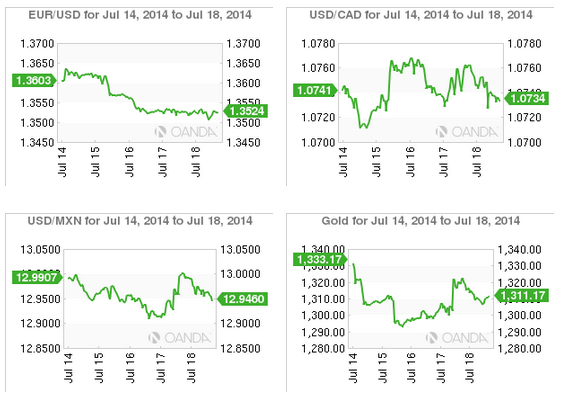Week In FX Americas: Inflation Concerns Come To The Fore
MarketPulse | Jul 20, 2014 01:12AM ET
- US consumer sentiment declines
- Consumer has a balanced view on inflation
- Canucks take price rise on stride
Despite the geopolitical event risk in play, a couple of North American economic releases on Friday gauged consumer sentiment and inflation concerns.
In the U.S, the preliminary University of Michigan Consumer Sentiment Index for July declined to 81.3 from a final June reading of 82.5. This month's early reading was well below the 83 prints expected. The report would suggest that U.S. consumers seem to be more cautious about their own economy's future. Many analysts had expected the American consumer to ramp up personal spending in the second quarter; especially since so many people stayed home during the particularly harsh winter.
It's worth noting that a more downbeat outlook does not necessarily equate to consumers pulling back from spending. The report could be a warning sign that higher gas prices (supply issues), coupled with overseas geopolitical events are beginning to dull household enthusiasms. The knock-on effect will potentially hurt the retailer's bottom line.
The U.S. consumer does expect a small pick-up in inflation over the coming year, but they appear to have a much more balanced view of long-run inflation (watched by the Federal Reserve). Their one-year expectations edged up to +3.3% from +3.1% at the end of June, but their longer-term view (five to 10 years) fell to +2.6% from +2.9%.
Canucks Take Rising Prices in Stride
In Canada, consumer prices rose more than expected in June (+0.1%), and the second quarter’s average consumer-price index (CPI) of +2.2% was above the Bank of Canada’s (BoC) boosted +2.1% forecast from midweek. Governor Stephen Poloz had forecast total CPI to average +2% in the third quarter and the core measure to average +1.7%. The surprise jump is not expected to influence the BoC due to the fact that food costs were again a strong contributor. It's a potential transitory factor that the BoC has suggested is unlikely to persist.
The loonie, as Canada’s one-dollar coin is known, likes the stronger-than-expected print, and it extended its earlier gains against the greenback ($1.0740) but it seems to have been a sour challenge to the Canadian bond market. In theory, the CPI increase should not be too supportive for the CAD since the BoC made it clear this past week that it considers the recent uptick transitory. The USD remains a better bid on CAD rallies.
In the bond market, CAD 10's backed up to +2.15% from +2.137%. Depending on which way the wind blows in Ukraine and the Gaza Strip, investors may find the Canadian product an attractive option should the madness continue. That, in turn, could push Canuck bond yields lower over time. When risk aversion dominates, fundamentals fall behind in importance.
What to Expect Next Week
North America gets to see the bulk of economic releases next week. The U.S. have a peek at prices and new home sales at the start of the week and ends with claims and Friday's durable goods orders. Canada is less busy and contends with retail sales mid-week.

Original post
Trading in financial instruments and/or cryptocurrencies involves high risks including the risk of losing some, or all, of your investment amount, and may not be suitable for all investors. Prices of cryptocurrencies are extremely volatile and may be affected by external factors such as financial, regulatory or political events. Trading on margin increases the financial risks.
Before deciding to trade in financial instrument or cryptocurrencies you should be fully informed of the risks and costs associated with trading the financial markets, carefully consider your investment objectives, level of experience, and risk appetite, and seek professional advice where needed.
Fusion Media would like to remind you that the data contained in this website is not necessarily real-time nor accurate. The data and prices on the website are not necessarily provided by any market or exchange, but may be provided by market makers, and so prices may not be accurate and may differ from the actual price at any given market, meaning prices are indicative and not appropriate for trading purposes. Fusion Media and any provider of the data contained in this website will not accept liability for any loss or damage as a result of your trading, or your reliance on the information contained within this website.
It is prohibited to use, store, reproduce, display, modify, transmit or distribute the data contained in this website without the explicit prior written permission of Fusion Media and/or the data provider. All intellectual property rights are reserved by the providers and/or the exchange providing the data contained in this website.
Fusion Media may be compensated by the advertisers that appear on the website, based on your interaction with the advertisements or advertisers.